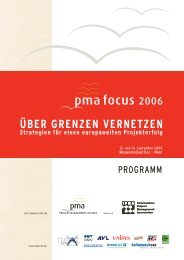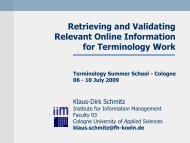Termine ~ Events - TermNet
Termine ~ Events - TermNet
Termine ~ Events - TermNet
Create successful ePaper yourself
Turn your PDF publications into a flip-book with our unique Google optimized e-Paper software.
Translation Studies in its modern form as a distinct inter- discipline has been in<br />
existence for several decades. We now have a number of specialized journals,<br />
hundreds of scholars who meet often for conferences, many theses, dissertations<br />
and academic positions.<br />
Clearly, Translation Studies matters to those who are engaged in it, be it because<br />
they find it fascinating as a scholarly activity, because it is part of their academic<br />
career, or for other reasons.<br />
But does it matter to others? Does it, for example, add value to practitioners of<br />
translation, by teaching them something useful and allowing them to enhance their<br />
translation skills, or perhaps by enhancing their status in society? Does it contribute<br />
to translator training by offering useful training methods, assessment criteria or other<br />
elements? Does it matter to other academic communities by contributing new<br />
knowledge and new methods from the realm of translation? Does it matter to society<br />
at large, for instance by showing what impact translation-related phenomena have<br />
had on various communities? Are some effects of Translation Studies still to come?<br />
Which, how and when?<br />
Contributions could address these important questions from many angles, for<br />
example by discussing the relations between Translation Studies and the practice of<br />
translation and/or between Translation Studies and translator training, by performing<br />
sociological analysis of the groups involved, by examining the relationship between<br />
Translation Studies and immigration policies, or the links between Translation Studies<br />
and new forms of electronic literacy. In addition, questions can be raised about the<br />
`interdisciplinary'<br />
nature of Translation Studies and its shifting and often problematic relationship with<br />
neighbouring fields.<br />
Sessions and Pre-congress workshops<br />
The congress programme is scheduled to start on the morning of 3rd September and<br />
end by lunch time on 5th September. It will include plenary sessions, panels, parallel<br />
sessions and posters.<br />
Pre-congress workshops will take place on 2nd September - two in the morning and<br />
two in the afternoon. They require a minimum of 20 participants. The provisional<br />
issues and moderators are:<br />
1. Critical reading for learning and self-improvement<br />
(Moderator: Daniel Gile)<br />
2. Democratization of knowledge through Specialized Translation<br />
(Moderators: Susanne Göpferich and Peter Kastberg)<br />
3. The challenge of using a plurality of methods in empirical<br />
translation research (Moderator: Gyde Hansen)<br />
4. Terminological issues in TS (Moderator: Gerhard Budin)<br />
(Estimated workshop fee: € 70)<br />
Paper proposals<br />
Abstracts of minimum 500 words with five keywords for 20 min. papers and for<br />
posters should be submitted online via this website:<br />
www.est2007.si




